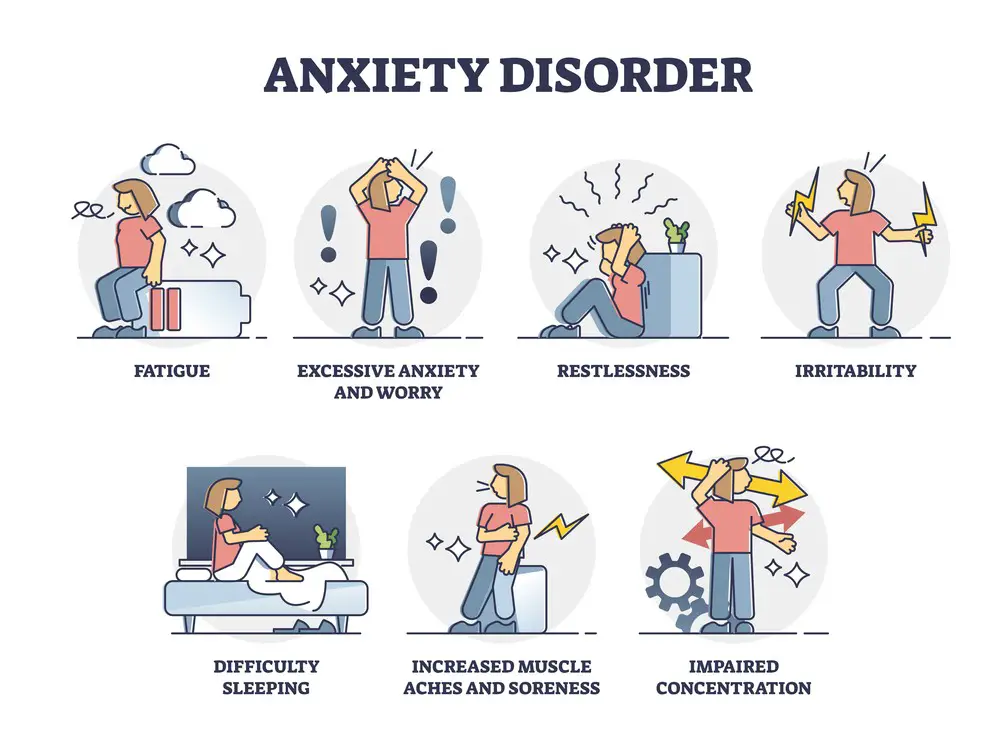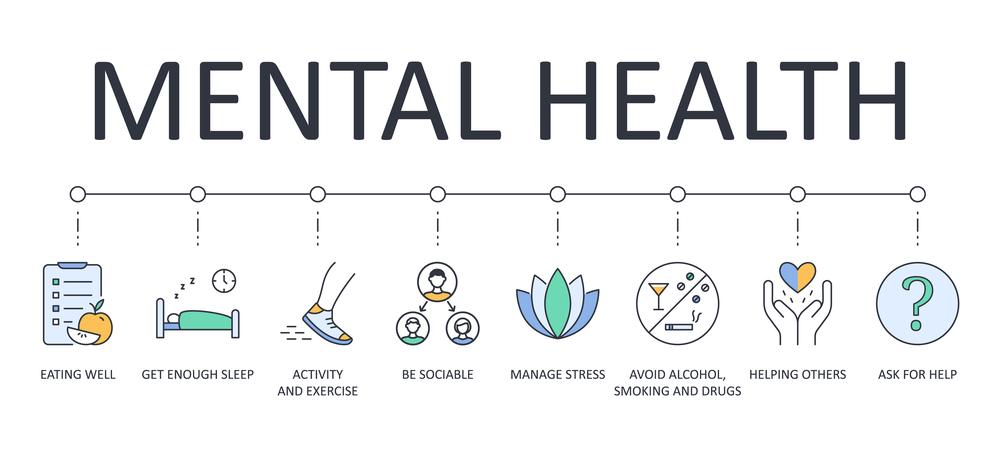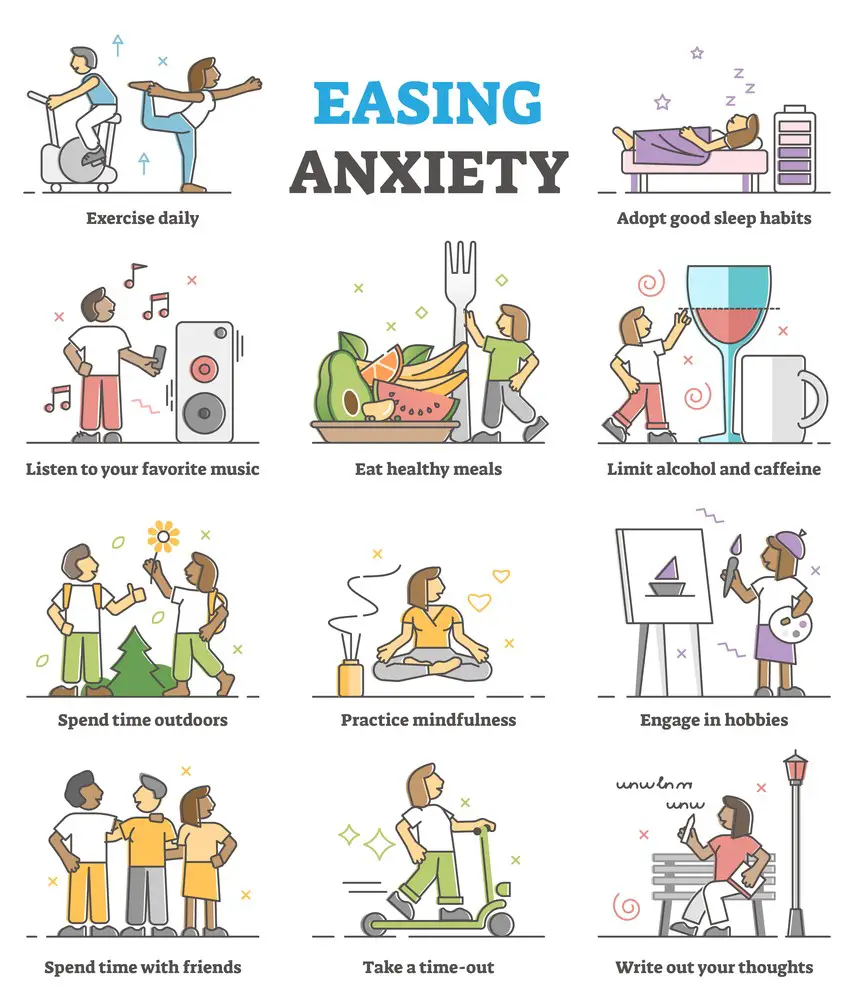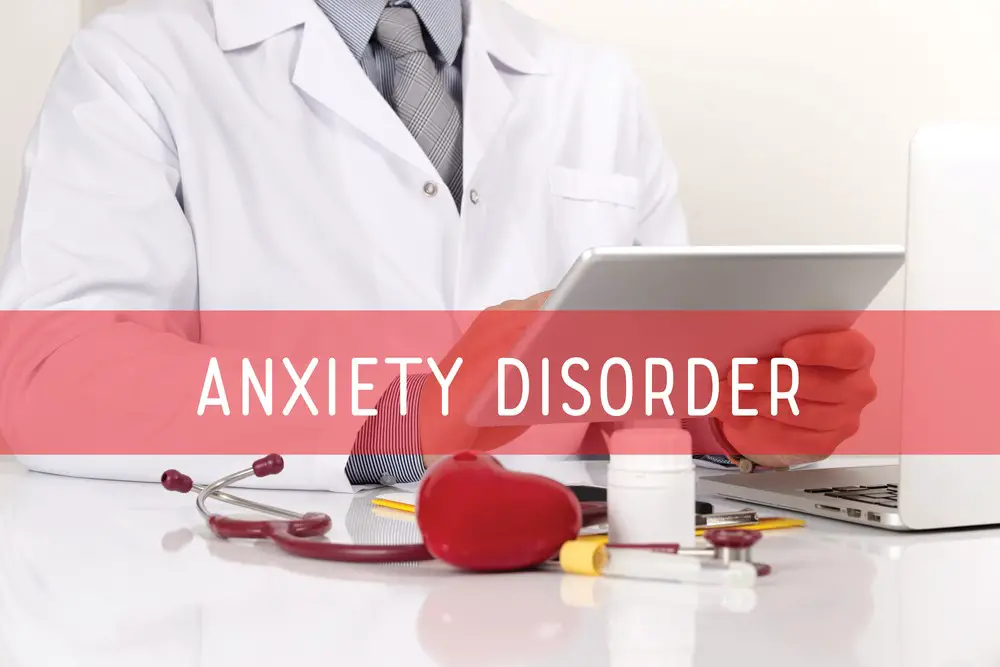As a BetterHelp affiliate, we receive compensation from BetterHelp if you purchase products or services through the links provided
Anxiety is a common emotion that we all experience at some point in our lives. Whether it’s before a big presentation, during a job interview, or when facing financial difficulties, anxiety can manifest in many different forms. While it may seem like just another passing feeling, the impact of anxiety on our well-being can be quite significant. In fact, according to the Anxiety and Depression Association of America, anxiety disorders are the most common mental illness in the United States, affecting 40 million adults aged 18 and older.
In this blog post, we’ll explore the impact of anxiety on our overall well-being and how to manage it effectively. Without further ado, let’s get started.
Affects Physical Health
 Anxiety can have a significant impact on our physical health. When we experience anxiety, our bodies go into “fight or flight” mode, causing an increase in heart rate and blood pressure. This response is meant to help us deal with perceived threats, but when it occurs regularly due to chronic anxiety, it can lead to long-term health issues such as high blood pressure, heart disease, and gastrointestinal problems.
Anxiety can have a significant impact on our physical health. When we experience anxiety, our bodies go into “fight or flight” mode, causing an increase in heart rate and blood pressure. This response is meant to help us deal with perceived threats, but when it occurs regularly due to chronic anxiety, it can lead to long-term health issues such as high blood pressure, heart disease, and gastrointestinal problems.
Additionally, people with anxiety disorders may have difficulty sleeping, which can lead to fatigue and weakened immune systems. You should consider anxiety treatment, which includes therapy, medication, and self-care practices to alleviate these physical symptoms and improve overall health. Consult a medical professional for personalized treatment options.
Impacts Mental Health
 It’s not surprising that anxiety has a significant impact on our mental health. Persistent worry and fear can lead to feelings of helplessness, hopelessness, and loss of control. Over time, this can develop into more severe mental health issues such as depression or panic disorder.
It’s not surprising that anxiety has a significant impact on our mental health. Persistent worry and fear can lead to feelings of helplessness, hopelessness, and loss of control. Over time, this can develop into more severe mental health issues such as depression or panic disorder.
Additionally, anxiety can also manifest as physical symptoms such as restlessness, muscle tension, and difficulty concentrating. These symptoms can be debilitating and interfere with daily life. Seeking therapy or counseling can help address these issues and develop coping mechanisms to manage anxiety effectively.
Interferes with Daily Life
Anxiety can significantly interfere with our daily lives, making it difficult to perform simple tasks or engage in activities we once enjoyed. For individuals with anxiety disorders, even the most mundane tasks may feel overwhelming and exhausting. This can impact our relationships, work performance, and overall quality of life.
It’s essential to seek help and develop healthy coping mechanisms to manage anxiety. With the right support and techniques, individuals can learn to navigate daily life with greater ease and reduce the impact of anxiety on their well-being.
Can Lead to Substance Abuse
Unfortunately, many people turn to substances as a way to cope with their anxiety. Alcohol and drugs may provide temporary relief from anxious thoughts and feelings, but in the long run, they can worsen symptoms and lead to substance abuse disorders. In fact, according to the Anxiety and Depression Association of America, nearly 20% of individuals with an anxiety disorder also struggle with substance abuse.
It’s crucial to address both anxiety and substance abuse simultaneously to achieve long-term recovery. The best way is to seek professional treatment and develop healthy coping mechanisms to manage anxiety without relying on substances.
Causes Relationship Strain
Anxiety can take a toll on our relationships with others. Constant worry and fears may lead to avoidant or clingy behavior, making it difficult for individuals with anxiety disorders to maintain healthy relationships. In some cases, the strain caused by anxiety can even lead to the breakdown of relationships.
It’s essential to communicate openly and honestly with loved ones about anxiety and its impact on relationships. By seeking support and developing coping mechanisms, individuals can work towards building stronger relationships with their partners, family members, and friends.
Negatively Affects Work Performance
Anxiety can significantly affect our performance at work. Constant worry and fear can lead to difficulty concentrating, making it challenging to complete tasks efficiently. This can result in a decrease in work productivity and quality of work.
Individuals with anxiety disorders need to communicate with their employers about their condition and any accommodations that may be necessary. Seeking professional treatment and developing coping mechanisms can also help improve work performance by reducing the impact of anxiety.
Decreases Quality of Life
Overall, the impact of anxiety on our well-being can significantly decrease our quality of life. Persistent worry, fear, and physical symptoms can make it challenging to enjoy daily activities and maintain healthy relationships. This may lead to isolation, hopelessness, and decreased self-worth.
However, with the right support and resources, individuals can learn to manage their anxiety and improve their quality of life effectively. The best way to do this is by seeking professional help, developing healthy coping mechanisms, and creating a support system of friends and loved ones. Seeking therapy or counseling and engaging in self-care practices can help reduce the impact of anxiety on one’s overall well-being.
Increases Risk of Developing Other Mental Disorders
 Anxiety is often accompanied by other mental disorders such as depression, obsessive-compulsive disorder (OCD), and post-traumatic stress disorder (PTSD). Individuals with anxiety disorders are 2-3 times more likely also to have another mental health condition. This is because anxiety can disrupt our brain’s chemistry and make us more susceptible to developing other conditions.
Anxiety is often accompanied by other mental disorders such as depression, obsessive-compulsive disorder (OCD), and post-traumatic stress disorder (PTSD). Individuals with anxiety disorders are 2-3 times more likely also to have another mental health condition. This is because anxiety can disrupt our brain’s chemistry and make us more susceptible to developing other conditions.
It’s crucial to seek help for anxiety to prevent the development of other mental disorders. With proper treatment and management of anxiety, individuals can reduce their risk of developing other conditions and improve their overall well-being. Remember, seeking help is a sign of strength, not weakness. Don’t be afraid to reach out for support if you’re struggling with anxiety.
Anxiety can have a significant impact on our overall well-being, affecting physical health, mental health, daily life, relationships, work performance, and quality of life. It’s essential to seek help and develop healthy coping mechanisms to manage anxiety effectively. With the right support and resources, individuals can reduce the impact of anxiety on their lives and improve their overall well-being. Remember, you are not alone in your struggles with anxiety, and seeking help is a sign of strength. Don’t hesitate to reach out for support if you’re struggling. Together, we can work towards managing anxiety and living fulfilling lives.
Recognizing When Anxiety Requires Medical Attention

Anxiety is a normal part of life, but it can sometimes spiral out of control, affecting our daily functioning and overall well-being. Knowing when anxiety has crossed the line from normal to a more serious condition requiring medical attention is crucial for taking appropriate steps toward healing. Here are signs that indicate it’s time to seek professional help:
- Persistent Worry or Fear: If you find that your anxiety is constant, overwhelming, and not tied to specific stressors, it may be time to seek help.
- Physical Symptoms: Anxiety doesn’t just affect the mind; it can manifest physically. Symptoms like chronic restlessness, headaches, muscle tension, or unexplained aches may indicate an anxiety disorder.
- Interference with Daily Life: When anxiety starts to significantly impact your job performance, school work, or relationships, it’s a sign that professional intervention may be needed.
- Avoidance Behavior: This behavior is a red flag if you’re avoiding situations or activities you once enjoyed because of fear or dread.
- Sleep Disturbances: Trouble falling or staying asleep, primarily due to worry or racing thoughts, can indicate an anxiety disorder.
- Panic Attacks: Experiencing sudden, intense bouts of fear or discomfort accompanied by physical symptoms like shortness of breath, dizziness, or heart palpitations warrants medical attention.
Deciding Between Drugs and Therapy: What’s Better?
 When it comes to treating anxiety, there’s no one-size-fits-all solution. The effectiveness of drugs versus therapy largely depends on the individual’s personality, the severity of their condition, and their circumstances. Here’s a brief overview to help you understand which option might be more suitable:
When it comes to treating anxiety, there’s no one-size-fits-all solution. The effectiveness of drugs versus therapy largely depends on the individual’s personality, the severity of their condition, and their circumstances. Here’s a brief overview to help you understand which option might be more suitable:
- Therapy: Ideal for individuals who are seeking to understand the root causes of their anxiety and develop coping mechanisms. Cognitive Behavioral Therapy (CBT) is particularly effective for treating anxiety disorders. Therapy is beneficial for those who prefer a drug-free approach and are willing to invest time into exploring their thoughts and behaviors.
- Drugs: Medication can be a quicker solution for reducing symptoms of anxiety, especially in severe cases where immediate relief is needed. Antidepressants, anti-anxiety medications, and beta-blockers are commonly prescribed. Medication may be suited for individuals who struggle with daily functioning due to their anxiety or those who have not found therapy alone to be effective.
- Combination: A combination of medication and therapy is often the most effective approach. Medication can quickly relieve symptoms, making it easier for individuals to engage in therapy and apply coping strategies daily.
Ultimately, the decision should be made in consultation with a healthcare professional who can assess your situation and recommend the most appropriate treatment plan. Remember, seeking help is a sign of strength, and with the right support, overcoming anxiety is entirely possible.
Charting Your Path: Setting Goals and Celebrating Every Milestone
 Setting goals and recognizing progress are fundamental steps in personal development, offering a roadmap to your aspirations and a way to measure your journey. Here’s a look at how to effectively set goals and acknowledge the progress you make towards achieving them.
Setting goals and recognizing progress are fundamental steps in personal development, offering a roadmap to your aspirations and a way to measure your journey. Here’s a look at how to effectively set goals and acknowledge the progress you make towards achieving them.
Setting Effective Goals
- Be Specific: Clearly define what you want to achieve. Vague goals make it hard to measure progress. Instead of “get fit,” aim for specific targets like “run a 5K” or “attend three fitness classes per week.”
- Make Them Measurable: Establish concrete criteria for tracking progress. If your goal is to improve your writing skills, a measurable goal could be “write 500 words per day” or “publish one blog post per week.”
- Ensure They’re Achievable: Your goals should stretch your abilities but remain within reach. Setting unrealistic goals can lead to frustration and demotivation.
- Be Relevant: Choose goals that are important to you and align with your values and long-term objectives. This ensures that your efforts are focused and meaningful.
- Set Time-Bound Targets: Having a deadline can create a sense of urgency and motivate you to take action. Whether it’s three months to learn a new skill or a year to save a certain amount of money, a timeline helps you stay focused.
Recognizing Progress
- Track Your Achievements: Keep a journal, spreadsheet, or app that helps you track your milestones. Seeing the steps you’ve taken towards your goals can be incredibly motivating.
- Celebrate Small Wins: Recognizing even the slightest progress encourages you to keep going. Finished a difficult task? Reward yourself with a break, a favorite snack, or an enjoyable activity.
- Reflect Regularly: Set aside time weekly or monthly to reflect on your progress. What have you learned? What obstacles did you overcome? This reflection can provide valuable insights and help you adjust your strategies.
- Share Your Progress: Talking about your achievements with friends, family, or a mentor can reinforce your sense of accomplishment and provide external validation.
- Adjust Goals as Needed: Recognizing progress isn’t just about celebrating what you’ve done; it’s also about realizing when goals need to be adjusted. If a goal no longer serves you, or if circumstances have changed, it’s okay to alter your course.
Setting goals and recognizing progress is a dynamic process. It requires patience, persistence, and a positive mindset. Progress is often non-linear, and setbacks are part of the journey. By appreciating each step forward, no matter how small, you’re not just moving towards your goals but also building resilience and a deeper sense of self-satisfaction.
- 7 Ideas to Help You Relax and Unwind on a Family Vacation - April 27, 2025
- How Having Cybersecurity Protection Helps You Relax - April 25, 2025
- 8 Reasons Why Spending Time Outside Calms You Down - April 25, 2025
This site contains affiliate links to products. We will receive a commission for purchases made through these links.


